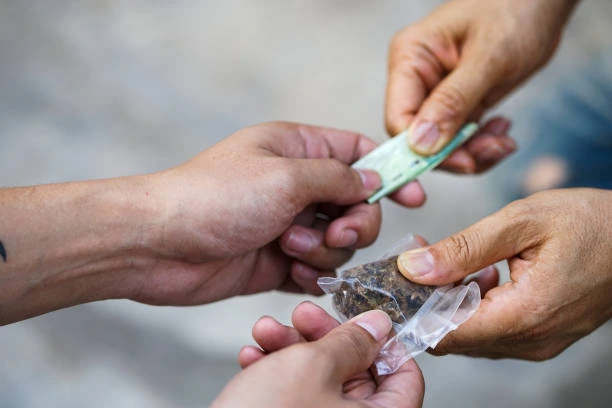If you are convicted of marijuana drug crimes, you could face indictments that can significantly impact your life. This underscores the importance of seeking legal assistance.
With an excellent marijuana possession attorney in Milwaukee from the Singleton Law Firm, you can challenge these criminal charges and work towards getting your life back on track.
Contact our Milwaukee marijuana law firm today for outstanding defense against weed charges. You can fill out the short form or call 262-581-4114.
Professional Legal Support for Felony Marijuana Charges
Felony-level marijuana drug possession and distribution charges in Wisconsin can carry life-altering consequences, including prison time, steep fines, and a permanent criminal record.
At The Singleton Law Firm, we bring not just seasoned but exceptional knowledge in handling high-stakes marijuana cases, including complex distribution and multi-offense situations. Our drug crimes lawyers are dedicated to protecting your rights at every stage and work relentlessly to secure the best possible outcome.
When your freedom is on the line, you need a legal team that knows how to fight—and win. With our expertise, you can be confident that your case is in good hands.
Fill out our form today to discuss your case.
Is Marijuana Legal in Wisconsin?
No, marijuana is not legal in Wisconsin for recreational or medical use. If caught with any amount, even a small one, you could face up to 6 months in jail and a $1,000 fine. Getting caught again becomes a felony—up to 3.5 years in prison and a $10,000 fine.
Marijuana, including products like THC gummies, oils, and vape pens, is illegal in Wisconsin. If you are caught with marijuana near a school or park, the penalties can be even more severe.
While some cities, such as Madison, have more relaxed local rules regarding marijuana, state law still applies. This means that even if it seems acceptable in one area, you could still face serious legal consequences.
Find out more about the risks of transporting marijuana across state lines into Wisconsin.
How Does a Marijuana Charge Affect My Record?
Getting a marijuana charge isn't just something that goes away—it can stay on your record for life.
That means every time you apply for employment, try to rent an apartment, or even get into school, that charge can show up. Employers and landlords often check your background, and a drug conviction might make them think twice, even if it was just a small mistake.
It's essential to recognize that a single charge can impact areas of one's life that you may not even realize.
If you've been facing criminal charges of marijuana possession, don't delay.
Call our trusted criminal defense attorney in Milwaukee at 262-581-4114 for a free consultation to protect your future.
Understanding Marijuana Possession Laws in Wisconsin
In Wisconsin, marijuana remains illegal for both recreational and medicinal use. Still, the state does allow the cultivation, processing, and possession of hemp as long as the THC content is below 0.3%.
Residents can use hemp-derived CBD freely, while marijuana-derived CBD requires a valid prescription and must be non-psychoactive. Strict penalties exist for marijuana possession.
Milwaukee has been ranked as one of the worst cities in the U.S. for marijuana-related criminal outcomes. Understanding your rights and the consequences of cannabis possession in Wisconsin is essential.
What Are the Penalties for Marijuana Possession in Milwaukee?
If you're caught with marijuana in Wisconsin, know that the laws are strict, even for small amounts. Wisconsin has some of the strictest marijuana regulations in the country, and Milwaukee County enforces them rigorously. Here's what you need to know:
-
First-Time Offense
-
Misdemeanor charge
-
Up to 6 months in jail
-
Fines up to $1,000
-
Yes, even a little THC can get you locked up
-
-
Second Offense
-
Becomes a Class I felony under Wisconsin law
-
Up to 3.5 years in prison
-
Fines up to $10,000
-
You’ll now have a felony record, which can affect jobs, housing, and more
-
-
Subsequent Offenses
-
Treated as felonies with even harsher penalties
-
Judges often push for longer sentences
-
Wisconsin has strict cannabis laws. Even having a joint can result in jail time and fines, especially in Milwaukee, one of the toughest counties for cannabis offenses. If you're facing charges, call an experienced marijuana lawyer to protect your future.
Contact us today — time is critical.
Navigating THC-Related Offenses and OWI Implications
Getting caught with THC products in Wisconsin isn’t something to take lightly, especially if you’re pulled over while driving or found with things like vape pens, oils, or edibles. Even small amounts can lead to serious legal trouble.
Can I Be Charged for Possessing THC Products Like Edibles or Oils?
Yes — and the consequences can be serious.
Even though marijuana laws are changing in other places, Wisconsin still considers THC illegal, even in the form of gummies, oils, or vape pens. If you’re caught with THC products, you can absolutely be charged, and it’s not something to take lightly.
Here’s what you need to know:
-
THC-infused edibles, oils, and wax are treated just like raw marijuana — or worse.
-
THC concentrates (like dabs, vapes, oils) often carry harsher penalties than regular marijuana.
-
Even small amounts can lead to drug charges that stick on your record for years.
-
If you’re pulled over and an officer believes you're high, you could face an OWI (Operating While Intoxicated) — with penalties like a DUI.
If you’re facing THC drug possession charges in Wisconsin, don’t wait. Talk to our Milwaukee drug crimes attorney now. The sooner you act, the more time the attorney has to fight your drug charges and protect your future.
Contact our defense marijuana law firm in Milwaukee at 262-581-4114 for help now. Time matters. So does your freedom.
Professional Legal Support for Felony Marijuana Charges
Facing felony marijuana charges in Wisconsin can be overwhelming, but you're not alone. At The Singleton Law Firm, we focus on defending individual cases for those accused of serious marijuana offenses, including possession with intent to distribute.
Attorney Justin Singleton brings nearly three decades of experience, including time as a detective, giving him unique insight into the legal system. We understand the complexities of these cases and are committed to protecting your rights. Our team will thoroughly investigate your case, challenge any unlawful evidence, and work tirelessly to achieve the best possible outcome.
Whether it's negotiating a favorable plea or fighting for you in court, we're dedicated to standing by your side every step of the way.
Don't let a felony charge define your future—call 262-581-4114 today for a free consultation.
What Should I Do If I'm Arrested for Marijuana Possession?
If you’re arrested for marijuana possession in Milwaukee or anywhere in Wisconsin, don’t panic.
Stay calm, and don’t say too much. Your words can be used against you later. The smartest move you can make is to contact a criminal defense attorney as soon as possible.
Here’s why legal help matters—and what to do next:
- Stay Silent
- Ask for an Attorney Immediately
- Don't Consent to Searches or Give Details
- Keep a Record of Everything
- Hire a Local Professional
If you're facing possession charges in Milwaukee, it's crucial to have a knowledgeable attorney on your side.
Attorney Justin Singleton has years of experience in criminal defense, including cases related to drugs. He understands the complexities of Wisconsin's marijuana laws and is dedicated to protecting your rights.
Don't navigate the legal system alone—schedule a consultation with The Singleton Law Firm to discuss your case and explore your options.
FAQS
What about CBD? Can I use that even though marijuana is illegal?
CBD can be used in Wisconsin. Average citizens can use CBD derived from hemp, while those with a doctor's approval can use marijuana based hemp if it doesn’t exceed the THC limits per the state’s laws.
How to get a medical marijuana card in Wisconsin?
Medical marijuana is only legal in the form of very low THC cannabis oil. You must be at least 21 years old, have a current diagnosis, and have a written certification from a doctor.



